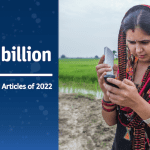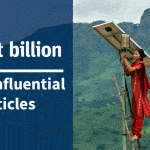Announcing NextBillion’s Most Influential Articles of 2023: Cast Your Vote in our Annual Contest by Jan. 7!
As 2023 draws to a close, it’s time for NextBillion’s annual tradition: our “Most Influential Article of the Year” contest. We’ve been running the contest since 2012, selecting 12 of our most-read articles from the past year and inviting readers to vote for the ones that influenced their thinking the most.
The contest serves three key purposes. First and most importantly, it allows us to express our gratitude — and give some well-deserved attention — to the entrepreneurs, investors, researchers and others who provide NextBillion’s original content. As an open forum for the discussion of impact-focused business in emerging markets, these articles are the foundation of the site. Though we’ve expanded our services and functionality in the past year, through our homepage redesign and new Business Development Opportunities page, our guest-written articles remain the centerpiece of our coverage.
Second, it provides our readers with an opportunity to highlight the kinds of articles they value most — which allows us to fine-tune our coverage. Both through the selection process (in which we tally up the traffic to articles published in the past year) and the voting itself, we gain valuable insights into the kinds of topics, businesses and thought leaders that interest our readers the most. It’s a valuable exercise for the site, strengthening our connection to our audience and providing insights that can help guide our editorial focus in the coming year.
And finally, the contest offers a hidden value — one that’s aligned with NextBillion’s position as a pioneer in the coverage of emerging markets and social business. It reveals some of the key trends, research, businesses and innovators that are shaping these sectors, as selected by our uniquely knowledgeable readership (over half of whom are entrepreneurs or high-level leaders themselves). Applying this lens to articles in the current contest, a couple of intriguing themes emerge, ranging from ways to increase businesses’ growth and impact (e.g., discussions of scale, systems change and shared infrastructure), to the need to manage the consequences of this growth on customers and communities (e.g., reducing e-waste from solar products, increasing transparency in carbon credits).
We invite you to read (or re-read) these outstanding articles, listed in alphabetical order below, and to vote for your favorites. To vote, scroll to the bottom of this page and make your selection. You can also vote at the bottom of any individual article in the contest. You can vote multiple times — up to once per hour — during the voting period, which will run from Dec. 22 to 11:59 pm on Jan. 7. While you’re here, if you’d like to get a sense of how impact-focused business in emerging markets has evolved over time, take a look at the winners of our past contests — or check out the filtering functionality we’ve added to our homepage and header/footer, which provides easy access to our full “back catalogue” of original articles and news excerpts, categorized by topic and sector and extending back to the site’s founding in 2005.
As always, we’d like to take a moment to express our appreciation of our guest writers and readers: It’s our privilege to collaborate with you each year as writers, and to engage with you as readers. Thank you for supporting NextBillion, and best wishes for a healthy and prosperous new year.
Stella Printezi, Celia Sanchez-Valladares Barahona and Lucía Tornero at Ashoka explore how funders can transform their increasingly outdated approach to better support long-term, systemic efforts to address major social issues.
Ben Jeffreys at ATEC Global highlights several key challenges that are reducing carbon credits’ credibility, and shares five recommendations that can address them.
Lucie Klarsfeld McGrath, Louise Berthault and Jeanne Charbit at Hystra discuss research that sheds light on the market for menstrual health and hygiene solutions in eight emerging economies.
Vishal Ghotge at Kiva announces the organization’s latest impact strategy — and reveals the process behind its creation.
Dan Waldron, Christopher Emmott, Priyanka Dudeja, Paraag Sabhlok and Christopher Wayne at Acumen explore why farming equipment powered by renewable energy must be combined with market access for maximum impact.
Sandra L. Draheim at the William Davidson Institute shares nine business case studies that offer a key teaching tool for the next generation of climate and energy entrepreneurs.
Sofia Ollvid at SolarAid explores a SolarAid program that is training technicians in Africa to repair solar devices, offering a promising solution to the problem of electronic waste.
Scale vs. Systems Change: Three Ways Impact-Led Organisations Can Achieve Both
Emma Colenbrander at Spring Impact, Nell Lemaistre at 100x Impact Accelerator, and Kasthuri Soni and Sharmi Surianarain at Harambee Youth Employment Accelerator explain why impact-led businesses and organizations don’t have to choose between scaling their own work and attempting to change the broader system.
Eva Valencia and Lennart Woltering at the International Maize and Wheat Improvement Center, and Frédéric Goulet at the Centre de Coopération Internationale en Recherche Agronomique pour le Développement discuss why global food security requires not only the scaling up of new innovations, but also the scaling down of old farming practices like tilling.
Brigit Helms at Miller Center for Social Entrepreneurship shares insights from social entrepreneurs in Miller Center’s Clean Water and Climate-Smart Agriculture program, who discuss their innovations and lessons learned.
David Porteous at Integral: Governance Solutions, Priya Vora at Digital Impact Alliance, Ravi Shankar Chaturvedi at Digital Planet and Peter Rabley at PLACE explain why digital public infrastructure (DPI) stakeholders should look beyond narrow use cases and existing systems to envision next-generation DPI approaches.
Jeffrey Ashe at Grassroots Finance Action urges the financial inclusion sector to focus on supporting informal savings groups rather than formal microcredit.
Sorry. This form is no longer available.
James Militzer is the managing editor of NextBillion.
Image adapted from a photo by Matt Kieffer
- Categories
- Agriculture, Energy, Environment, Finance, Investing, Social Enterprise, Technology, WASH



